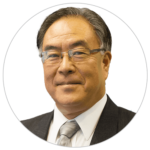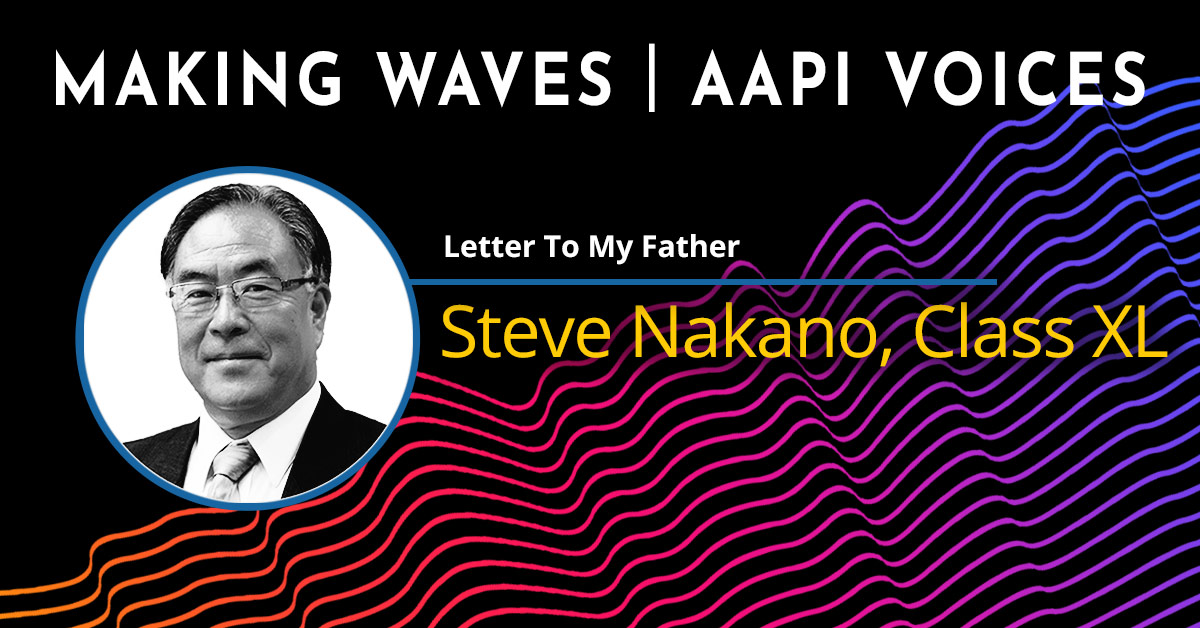Letter To My Father
Editor’s note: Steve Nakano shared this letter with his brothers and nephews, which opened up new learning and sharing among family members across generations. This holiday season, we invite you to consider what letter you would like to write to a family member or what conversations you would like to have with relatives or other loved ones.
Dear Dad,
It has been over 4-years since you passed away. Even though I gave your eulogy, that was about you. It was not to you. Nor was it for you. It was for others. This letter is long overdue.
Whenever I speak of you, I invariably say that you were always “yelling” at me. It seemed that we couldn’t be in the same room for a few minutes without you being critical of me. I didn’t understand why—I got good grades. I excelled at sports, music, and art. Since Uncle Frank passed away two years ago, I came to understand that Grandpa Gonkichi Nakano never told you that he loved you. Uncle Frank told me that he remembered Grandpa patting him on the head and saying, “you’re a good boy” when he was six years old. I don’t have to wonder what it was like for you growing up and looking for his approval. That is why it sticks with me that even on my best days, you always said that I should have done better.
You often said that my priorities were “all screwed up” because I did not prioritize academics enough. Perhaps, that is how you and Uncle Frank sought grandpa’s approval. You and Uncle Frank achieved the pinnacle of success in your careers in science and medicine. That is how you both lived without his apparent approval. You taught me that if I loved something enough, I would NOT need your approval. I would do it anyway.
There are so many things that you said to me that shaped my life. I remember you saying that if someone could not give a simple answer to a complex question, he or she was “a Charleton.” Your word. He didn’t know what he was talking about. Indeed, you taught me trigonometry in one night. You taught me there are no wrong questions. There are only wrong answers. You were a tough teacher. You told me a story about when you were a graduate student teaching Quantum Mechanics at UCLA and flunked half the class, and your advisor told you that you couldn’t do that. You were a tough teacher. I set out seeking another teacher to whom I could ask my questions without being made to feel bad for asking. Or, being told, “Think about it. Don’t ask me before thinking about it.”
In 7th grade, I asked Reverend, “If the Buddha became enlightened by meditation, why don’t we practice meditation? He looked at me for a moment. He turned away and said, “We just don’t.” He walked away. I knew in that moment that he could not be my teacher. I began my meditation practice later that year. That is another story for another time. It was a lesson earned and hard learned.
You counseled me to stick to questions of math and science for which there is empirical evidence to support the correct answer. You named me after Hideki Yukawa. I was more interested in questions like, “how does one know if they are truly in love.” This question crystallized to “What is the operational definition of love?” I read everything I could on the topic of love, but I found no suitable answer. I read everything about what love is and isn’t. This was a ten-year study and often a nightly meditation. I am certain that you would have criticized my efforts. You would have said that I was wasting my time and that my “priorities were all screwed up.” The answer came to me my junior year at Cal in a poem read in an Asian Studies class about finding our identity, and it has worked for me for many years.
“Love is the human need to be completely vulnerable with another human being and feeling safe at the same time.”
Love is hard. It is difficult to be vulnerable and to feel safe at the same time. That is why it is volatile, elusive, and fleeting sometimes. Being vulnerable takes confidence and fearlessness. With practice, you can “fall in love every day.” But, with love comes an awesome responsibility to keep the object of one’s love safe.
It took reading many Buddhist texts to understand why Pure land Buddhists do not practice meditation. It took many years of meditation to understand why Shinran Shonin did not teach meditation but chose instead to teach the Buddha’s primal vow that all sentient beings will become enlightened as a matter of faith rather than practice.
It was one of the great Buddhist teachers you recommended me to read that helped me understand meditation. I do NOT know how you knew to recommend reading the works of D.T. Suzuki. His writings helped me along my path. I read a book in which Suzuki explained, “Satori,” that I chanced to understand the meaning of “duality.”
Suzuki explained that as soon as humankind created language, we limited ourselves to thinking in words. When we sit down to think about something, we literally “talk to ourselves.” Words are objective things. They have limited meaning, convenient for limited expression. However, great thinkers (scientists) artists, musicians, athletes, and dancers do NOT limit themselves to thinking in words. He wrote that truth cannot be known by limiting our thinking to words. “Only in silence does object and subject become one. Only in silence do we become vessels of God. Yes, Suzuki says…God fills us! Commonly, great artists say that when they “get out of their own way” God fills them and works through them. It may have been how Einstein came to think beyond that which was already known to science.
A person who is “full of himself” leaves no room for God, no room for insight or truth. Zen writers say, “To find the self is to lose the self. And, to lose the self is to become one with the ten thousand Buddhas.” The purpose of meditation is to become empty. In emptiness, we lose the self, and in losing the self is the promise of enlightenment. Easier said than done.
I went to see a spiritual healer when a good friend died of an aneurysm. I gave his eulogy. The healer’s name is Jane Church. I doubt you would believe in her acute powers. She changed the course of my meditations and my spiritual practice. She told me that my “gift” was NOT wisdom. My gift was joy. She asked me what gave me joy. I answered, “music.” I omitted children even though children have always given me joy. Then she asked, who placed fear in the place where joy resides? I thought of the time we argued, and you told me, “No son of mine is going to be a goddamned musician.” You feared that I could not make a living playing music, and you placed that fear on the chest plate of my heart (my sternum). I was also afraid that I would become a father who never told his children that they were enough or that I loved them.
Two years into my contemplation of joy, another friend, who has also since passed, volunteered me to give a “talk” to addiction counselors at an AA and NA conference. The topic he chose for me was law as a spiritual practice. What came out of that voluntary assignment was a paper that I shared with you entitled “Zen Question Zen Answer.” Soon after writing Zen Question Zen Answer, I was asked to speak at the Palo Alto Buddhist Temple by your friend, Jeanette Arakawa. She asked you to speak there some ten years prior. It was the first of my writings and the only time that I ever shared something I had written with you. It was the first time (perhaps the only time) that you didn’t criticize me or say that I could have done better. You said, “Why don’t you share this.” I did. I continue to share it. It is always relevant to my work.
The form itself assumes a student and teacher relationship. The student asks difficult questions. The master gives simple answers to the mysteries of life, demonstrating deep understanding. It was your insistence that an answer to a difficult question must be simple and elegant that has shaped my thinking and my writing.
Zen Questions: What is Spirituality? Zen Answer: Anything that lifts your spirits. Zen Question: What is the opposite of Spirituality? Zen Answer: Suffering and addiction. Zen Question: What is addiction? Zen Answer: Addiction is obsession with seduction. Zen Question: What is seduction? Zen Answer: Seduction is being attracted to something that you know is bad for you. Zen Question: How do I know if I’m an addict? Zen Answer: If you are impatient and you procrastinate at the same time. These character defects should not co-exist. If they co-exist in you, chances are you are an addict. Zen Question: How do I stop being an addict? Zen Answer: By becoming an enlightened being. Zen Question: How do I become an enlightened being? Zen Answer: Choose a spiritual path and practice every day. Zen Question: How do I begin? Zen Answer: You have already begun. Zen Question: What should I practice? Zen Answer: Letting go. Zen Question: Letting go of what? Zen Answer: Everything that is negative and anything that is unnecessary. Zen Question: Is there anything that I should hold onto? Zen Answer: Yes. Joy. Zen Question: What about love? Zen Answer: Sure, sure, sure, love too. Zen Question: Which is greater? Zen Answer: Joy. Zen Question: Why is joy greater than love? Zen Answer: Only joy can overcome suffering. Zen Question: Can love overcome suffering? Zen Answer: Love is often intertwined with suffering. Suffering cannot exist in the same moment as joy. Zen Question: (Silence) … I think I understand. Zen Answer: (a smile).
Dad, today I wrote this love letter to you. I am sorry it has taken me so long to write to you. You and Mom were my first teachers. You shaped the way that I think and the way that I write. You once wrote a letter to me when I wanted to run for student body president over prioritizing my academics in which you said, “Nothing worthwhile comes easily.” Today I will stop struggling for your approval. I will “paint in the second eye of the Daruma,” and I will continue my practice. Thanks for listening.
Love, (Your number one son)

Steven Hideki Nakano
About Making Waves | AAPI Voices
This article is part of the Making Waves – AAPI Voices project by ALF Silicon Valley’s AAPI Caucus. Through an ongoing series of letters and other forms of creative expression by ALF Senior Fellow guest contributors, we aim to share the experiences of Asian Americans & Pacific Islanders (AAPIs) with the broader ALF network. We are proud of AAPIs’ contributions to our multiracial society and believe we can help strengthen our community and democracy by sharing our stories to build understanding and solidarity.
View all current contributions to this series here.
The title of this project, Making Waves – AAPI Voices, is inspired by the book Making Waves, An Anthology of Writings By and About Asian American Women. We thank editor Dr. Elaine Kim and Asian Women United of California for their groundbreaking work and permission to use the title.
Tell us what you think. Want to start a dialogue? Contact Akemi Flynn.




